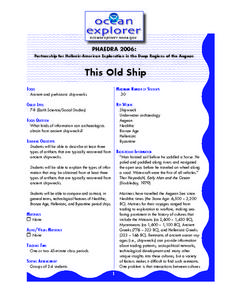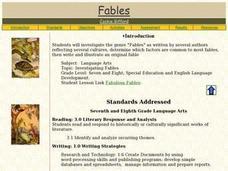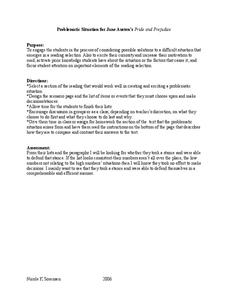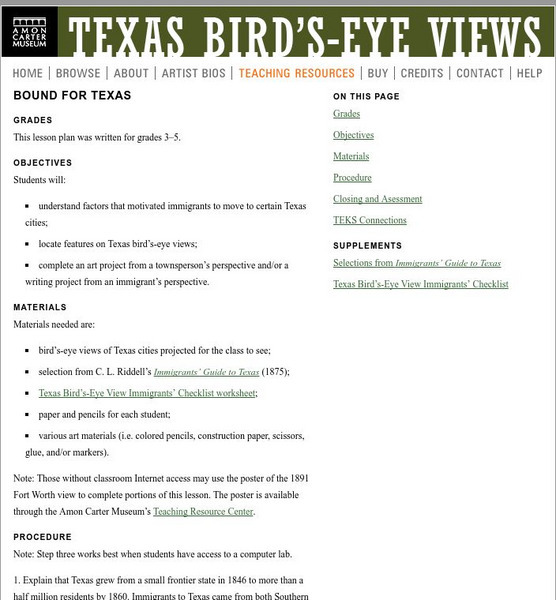Facing History and Ourselves
Do You Take the Oath?
Why did so many go along with Nazi policies during World War II? An investigatory unit includes four handouts, reading analyses, classroom discussion topics, and intriguing philosophical questions, helping learners understand the...
Curated OER
This Old Ship
Junior archaeologists will be able to describe shipwreck artifacts and the information they reveal. They work in small groups to reasearch wreckage features of different period ships, making this not only a science lesson, but a social...
Curated OER
Investigating Fables
Time for a story! Learners of all ages enjoy listening to stories, so read them some common fables and have them work cooperatively to create a fable. Differentiate for varying ability levels by providing sentence frames, graphic...
EngageNY
Matrix Multiplication and Addition
To commute or not to commute, that is the question. The 26th segment in a 32-segment lesson focuses on the effect of performing one transformation after another one. The pupils develop the procedure in order to multiply two 2 X 2...
Foreign Policy Research Institute
The Mind of a Terrorist: A Psychosocial Perspective
What a great way to make a psychology lesson on personality development socio-politically relevant! Class members investigate causes of radicalism--specifically, becoming a terrorist. This resource includes background information, key...
Curated OER
Sink or Float?
Have your class explore density and buoyancy using this resource. Learners read the book Who Sank the Boat, and use several items, such as rubber balls, bottle caps, wood, and other household items to conduct an experiment. Using a tub...
Curated OER
Pride and Prejudice: Problematic Situation
What would you do if your sister ran off with a man whom you didn't trust? Explore a scenario based on Jane Austen's Pride and Prejudice. Once kids work though the problem, they read the appropriate chapters from the book and write...
National Endowment for the Humanities
Lesson 1: On the Road with Marco Polo: A Boy in 13th Century Venice
Learners investigate Marco Polo's life as a young boy in 13th century Venice. They analyze maps, explore various websites, complete a chart and answer discussion questions, and create a travel brochure about visiting 13th century Venice.
San Diego Community College
Step by Step Goal Setting
Help English learners reach their goals with a set of activities and worksheets. Over the course of three lessons, pupils define what a goal is and set their own academic and attendance goals for class.
Facing History and Ourselves
The Holocaust: Bystanders and Upstanders
Scholars analyze the role of bystanders during the Holocaust. The investigation explores the roles of the bystanders, upstanders, and rescuers with primary and secondary resources to determine actions taken—or not—and their implications...
Curated OER
Introduction to Drama
Introduce your class to drama! You cast each pupil as a different character from a story you have read. They are given a general outline of the scene, act out the scene multiple times, then discuss the weak and strong aspects of each...
Curated OER
Where Am I?
Extensive background on marine navigation is provided for you as the teacher. Assign groups to research marine navigation techniques and construct astrolabes. Resource links are listed for extension ideas. If you are teaching an...
Curated OER
Examining and Discussing the Mechanics of Horse Evaluation
Via teacher-led discussion, agriculture classes discover the desirable characteristics of horse anatomy. The PowerPoint and worksheet mentioned in this plan are not available; however you may find the notes useful as a guide to the...
Curated OER
Immigration: A History
Studnets trace how immigration patterns have changed in America's history. They analyze the relationship between economic growth and immigration.
Curated OER
Video Biographies
Who was Alexander The Great? How did Abraham Lincoln’s early life influence his political life? Learners select a historical figure to use for video biography. After developing research questions and collecting information, pupils search...
Council for Economic Education
Econ Ed Link: The Price of Gasoline: What's Behind It?
In this lesson plan, students investigate the variables that contribute to the cost of gasoline. They learn that while OPEC nations do influence the price of oil and thus the price of gasoline, other factors also influence the price.
Council for Economic Education
Econ Ed Link: Transportation: They Say We Had a Revolution (Part 3)
Advancements in transportation have played a key role in the growth of our nation. U.S. government policies have also had a considerable impact on the development of transport as we know it today. In this series of three lessons, the...
Other
Amon Carter Museum: Bound for Texas
Students will explore factors that motivated immigrants to move to certain Texas cities by locating features on Texas bird's eye views. They will then complete an art project from a townperson's perspective and/or a writing project from...
















